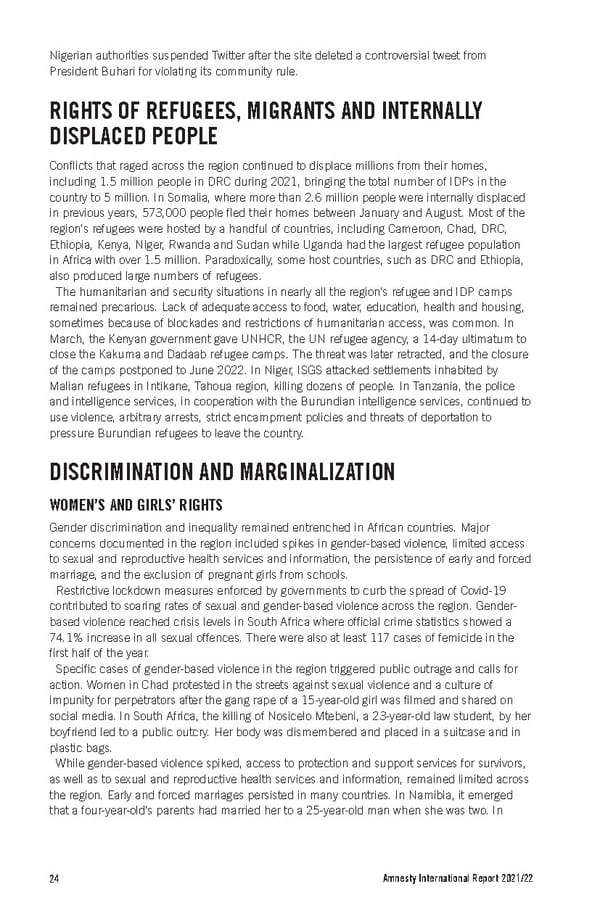Nigerian authorities suspended Twitter after the site deleted a controversial tweet from President Buhari for violating its community rule. RIGHTS OF REFUGEES, MIGRANTS AND INTERNALLY DISPLACED PEOPLE Conflicts that raged across the region continued to displace millions from their homes, including 1.5 million people in DRC during 2021, bringing the total number of IDPs in the country to 5 million. In Somalia, where more than 2.6 million people were internally displaced in previous years, 573,000 people fled their homes between January and August. Most of the region’s refugees were hosted by a handful of countries, including Cameroon, Chad, DRC, Ethiopia, Kenya, Niger, Rwanda and Sudan while Uganda had the largest refugee population in Africa with over 1.5 million. Paradoxically, some host countries, such as DRC and Ethiopia, also produced large numbers of refugees. The humanitarian and security situations in nearly all the region’s refugee and IDP camps remained precarious. Lack of adequate access to food, water, education, health and housing, sometimes because of blockades and restrictions of humanitarian access, was common. In March, the Kenyan government gave UNHCR, the UN refugee agency, a 14-day ultimatum to close the Kakuma and Dadaab refugee camps. The threat was later retracted, and the closure of the camps postponed to June 2022. In Niger, ISGS attacked settlements inhabited by Malian refugees in Intikane, Tahoua region, killing dozens of people. In Tanzania, the police and intelligence services, in cooperation with the Burundian intelligence services, continued to use violence, arbitrary arrests, strict encampment policies and threats of deportation to pressure Burundian refugees to leave the country. DISCRIMINATION AND MARGINALIZATION WOMEN’S AND GIRLS’ RIGHTS Gender discrimination and inequality remained entrenched in African countries. Major concerns documented in the region included spikes in gender-based violence, limited access to sexual and reproductive health services and information, the persistence of early and forced marriage, and the exclusion of pregnant girls from schools. Restrictive lockdown measures enforced by governments to curb the spread of Covid-19 contributed to soaring rates of sexual and gender-based violence across the region. Gender- based violence reached crisis levels in South Africa where official crime statistics showed a 74.1% increase in all sexual offences. There were also at least 117 cases of femicide in the first half of the year. Specific cases of gender-based violence in the region triggered public outrage and calls for action. Women in Chad protested in the streets against sexual violence and a culture of impunity for perpetrators after the gang rape of a 15-year-old girl was filmed and shared on social media. In South Africa, the killing of Nosicelo Mtebeni, a 23-year-old law student, by her boyfriend led to a public outcry. Her body was dismembered and placed in a suitcase and in plastic bags. While gender-based violence spiked, access to protection and support services for survivors, as well as to sexual and reproductive health services and information, remained limited across the region. Early and forced marriages persisted in many countries. In Namibia, it emerged that a four-year-old’s parents had married her to a 25-year-old man when she was two. In Amnesty International Report 2021/22 24
 Amnesty International Report 2021/22 Page 23 Page 25
Amnesty International Report 2021/22 Page 23 Page 25